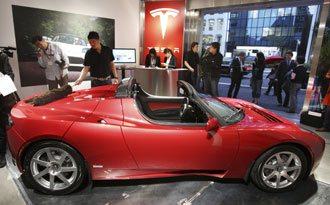Tesla Opens First Asia Showroom in Tokyo
Tesla, the U.S. maker of electric sportscars, opened its first Asian showroom Monday in a fashionable Tokyo neighborhood, hoping to woo rich buyers before eventually widening its appeal with cheaper models.
The Palo Alto, California-based Tesla Motors Inc. has globally sold only 1,400 of the electric cars — which start at $101,500 in the U.S. (and 1.5 times that in Japan). Its electric vehicles are currently more akin to gadgets than mass-produced cars.
And while the price for electronic vehicles is likely to come down, a major drawback remains the lack of recharging stations, which make them risky for long treks.
But Tesla has important connections in Japan. Toyota Motor Corp. is a shareholder in the American company, recently investing $50 million in Tesla stock, and signing a $60 million contract to have Tesla help develop an electric version of Toyota’s RAV4 crossover vehicle. Prices have not been announced.
Japanese electronics maker Panasonic Corp. also supplies the cars’ batteries.
“We think the Japanese market is a fantastic market,” Tesla Chief Executive Elon Musk said in a videotaped message relayed in the showroom, displaying the snazzy cars.
Yasuaki Iwamoto, auto analyst at Okasan Securities Co. in Tokyo, says Tesla could influence Toyota in a positive way because Tesla’s approach is so different from Toyota’s. The Japanese automaker is known for its affordable, reliable, if unflashy, cars that are mass-produced in old-style plants.
“In the era of electric vehicles, automakers have to change their way of thinking,” Iwamoto told The Associated Press. “Toyota is intrigued by something as alien to its legacy as Tesla.”
In Japan, electric vehicles are tax-free and eligible for government incentive cash payments that can reduce the price tag by a quarter of the retail price.
Tesla’s ecological government-backed rebate in Japan is a hefty 3.2 million yen ($40,000).
More affordable electric vehicles are on the market already, such as the iMiEV from Mitsubishi Motors Corp., although sales at about 4,000 vehicles, mostly in Japan, still make a tiny fraction of overall auto sales.
Already showing wider appeal is Nissan Motor Co.‘s Leaf electric car, set for delivery in December. Its price in Japan is about 3 million yen ($37,000) with incentives, and about $25,000 in the U.S. with federal tax credits. Nissan has received 20,000 orders for the Leaf in the U.S., and 6,000 in Japan.
Takao Ozawa, 38, an entrepreneur, who drives Japan’s first Tesla electric car, loves the quick, gear-less and silent acceleration of his Tesla, but acknowledges that he only uses it for his office commute and relies on a regular gas engine Citroen to go on trips.
“It’s a great car,” said Ozawa, who used to drive a Ferrari. “I don’t have to feel guilty driving it either.”
Chris Paine, who made the 2006 film, “Who Killed the Electric Car?” is making a new film that documents the success of Tesla, Leaf and other electric vehicles.
“Times have changed. The carmakers can see they can make some money on this, and they don’t want to be the last to jump on,” he said from Culver City, California. “The electric car promised to make the car sexy again.”
YURI KAGEYAMA, AP Business Writer TOKYO

A showroom worker cleans a Tesla electric sports car which is on display at Tesla's first Japanese showroom in Tokyo on Monday, Oct. 25, 2010. The Palo Alto, Calif.-based maker of electric sportscars opened its first Asian showroom in Tokyo on Monday. (AP Photo/Koji Sasahara)

